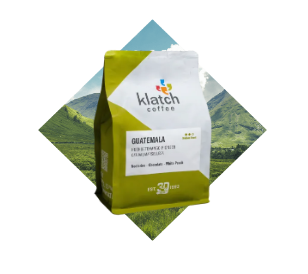
About this Coffee
We are excited to release this wonderful and complex coffee featuring all of the best from Guatemala in one cup: flavor notes of nectarine, chocolate and with a white peach finish. Also undertones of lemon and sweet herb.
Guatemala Huehuetenango Pioneers is a coffee born out of partnerships. The coffee is produced by approximately 450 members of Comal and Asdeflor Cooperatives in La Democracia Comal. Recognizing excellence in quality and in the communities that produce it, exporter UNEX chose this coffee for a collaboration between their Farmer Aid social platform and the nonprofit Hanns R. Neumann Stiftung (HRNS).
This exceptional coffee grows between 1200 and 1650 meters above sea level. It is hand pulped, fermented for 12-36 hours, washed, and dried on household patios for up to 15 days depending on weather conditions. Subsequently it is prepared for export at Ixchel mill by UNEX.
Asociacion Civil Comercializadora Maya Alternativa
Asociacion Civil Comercializadora Maya Alternativa (COMAL) was formed in 2006 by three associations (one being a women producer association). Sharing a dedication to sustainable ecology, they united with the objective of strengthening their technical and productive capacities. Their collective power allows them to better commercialize their coffee and gain access to technical training and assistance, certifications, roasting and packaging services, access to organic inputs, and forest nursery projects – all critical tools for improving livelihood that were previously difficult to attain. Additionally, the association encourages youth participation and seeks to empower women, evidenced by their positioning on the Board of Directors as well as project managers.
Farmer Aid and UNEX
Farmers Aid provides supply chain support and UNEX sources quality coffee from communities with strong values. Together, their initiative is built around four main pillars: health, education, sustainability,
and a Coffee and Climate-Alliance with Neumann Foundation.
They have created annual access to eleven medical and dental clinics in key coffee regions, accessible to small producers. Additionally, they facilitate eleven kindergarten and camp programs for the children of producers, held at strategic times of year to mitigate child labor. Their sustainability effort consists of the MOCCA Program (a USAID Alliance) that provides training to over 3000 small producers in Santa Rosa and Central Valley Regions, including training in best agricultural practices and entrepreneurial education.
New programs in process under the Farmer Aid Initiative at UNEX include a full renovation of their flagship wet mill in Alotenango, Sacatepequez, which will result in significant reduction of water usage. They are also partnering with World Central Kitchens to donate 100 gas stoves to smallholder producers, replacing wood stoves, which will impact individuals’ health as well as reduce carbon emissions.
Hanns R. Neumann Stiftung
Hanns R. Neumann Stiftung (HRNS) is an independent foundation working to support smallholder families in coffee regions. Much of their work is executed through partnerships with like-minded organizations in public and private sectors and focuses on the welfare and education of youth as well as protection of the environment.
This community’s partnership with HRNS has been a long-term collaboration. They were previously linked through HRNS the Coffee Kids Program, which raised capital to support young producers in the form of grants. These grants resulted in the implementation of Bee Keeping and Laying Hens projects, executed by individual producers in the community.
Current support from HRNS is multi-faceted. They provide year-round field training, seed capital for business start-ups, donation of rust-resistant coffee varieties to producers, and access to a diversification program that promotes inter-crop planting of fruit and avocado trees.
History of Guatemalan Coffee:
Although coffee was brought over from the Caribbean in the mid-18th century by Jesuit priests, it was used primarily as an ornamental plant and garden crop for 100 years in Guatemala. Coffee wasn’t widely traded, however, until commercial production began in the 1850s. The volcanic soil and various micro-climates proved ideal for growing coffee in Guatemala. Coffee, within a generation, became the country’s most important crop. In 1860, Guatemala exported 140,000 pounds of coffee, and just 25 years later, the country was exporting over 40 million pounds. Large numbers of coffee farmers were German immigrants responsible for many inventions and innovations related to coffee milling. Most of Guatemala’s coffee was exported to Germany until the First World War, when exports shifted to the United States.